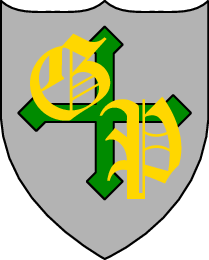Thanatopsis: An Answer to William Cullen Bryant
Donald P. Goodman III
William Cullen Bryant's classic poem Thanatopsis ("view of death") is still read in most American schools as an example of early nineteenth-century American poetry, and it is a fine example of that. Prior to Whitman, Bryant was likely the most famous of American poets. However, Thanatopsis provides what Christians would likely believe to be a very simplistic and depressing view of death. This poem tries to follow Bryant's lead while still giving a more enlightening view of its topic.
Thanatopsis: An Answer to William Cullen Bryant
Bow down, O Death, whose claws are dull as knobs, whose fangs can neither bite nor rip nor tear; fall to your kness, O Reaper great and strong, and cease with dulled scythe to chase and scare. You've gather'd in a harvest great and large, but with your gathering I'm not impress'd. You've taken many men into cold earth in many thousand years of endless quest. You tell me to fear not, that I shall be asleep with patriarchs and monarchs great; that cold, cold earth to which you take my flesh you tell me's just the bedroom of cruel fate, the destiny of ev'ry man alive, at some a sooner, some a later date; that it's been quite a long and tiring day, that I'll want that cold bed; for it is late. The sun is tir'd of shining down on me, th'embrace of ocean shan't engulf my flesh; I'll be a brother to eternal rocks, included in the mighty oak's root mesh. You say I'll lay to sleep not me alone, but have the company of mighty men; the hoary seers, the wise, the good, the kings, the lords of earth, the powerful; and then, you tell me that the beauty that I see-- the hills, the mountains, mighty woods and streams; the forests stretched across the Russian plains, all nature's less, not more, than she now seems. You say the glor'ous sunrise o'er the peaks of blue-ridged mountains, sending sparkling light reflecting off the quiet ri'er below, and making me to think on truth and right; you say that vast expanse of water fresh, all stretching out as far as eye can see; behind me mighty, ancient woods, so deep that no man could e'er plumb them, much less me; that that great hole in those great desert sands, replete with reds and orange, blue and greens, and that great river flowing through its bowl and bringing life to California dreams; and that that vast expanse of salty waste engulfing most of this, our gorgeous world, embracing ev'ry corner of the land, about each shoreline delicately curl'd; you say that all these things are nothing much-- just nature's things, which God put into her. For they adorn the earth, where dead men lie; they're but adornments for our sepulchre. Well, I say, Death, you're wrong, that beauty lies reflected in these glor'ous works of God; the salt, the fresh, the woods, the mountains blue are more than just a tombstone in the sod. I say the earth that holds them's greater, too, than just a grave which makes so many grieve; for tombs hold men forever, don't let go; what kind of tomb is it that men shall leave? I say you're wrong, I shall not lie with kings, nor patriarchs, nor troops kill'd in full kit; I shan't go lay with noble men and true, for I go not to lay at all; I'll sit; I'll sit with he who's king of all those kings, who guides what's tir'd of shining on my head; who rules that cold, hard bed that isn't cold, who made the tomb which shall not hold the dead. I'll see those beaut'ous sights for my first time and finally marvel o'er what makes them great; I'll witness with my eyes those mighty works and know that I don't stand there thanks to Fate, nor thanks to some unguided destiny; I'm brought there by the One who made these works, these great and glor'ous sights, first of them man, not by this Death, who in the shadows lurks. Death, thou shalt die, and all the dead shall live; your worn-out scythe, now dull, shall broken be; you shall not take this harvest to the barns, for he who loves me seeks to gather me. So I fear not your bed; I will not go; and I prepare, with penance and with mirth; a hooded figure leads me from my flesh; I do not go to death; I go to birth.The poem echoes some of Bryant's imagery (including the use of the word "hoary," a bit rarer these days than in those), but turns it on its head, to view death as a matter of hope rather than of mere acceptance. We hope that the reader derived some value from these lines.
